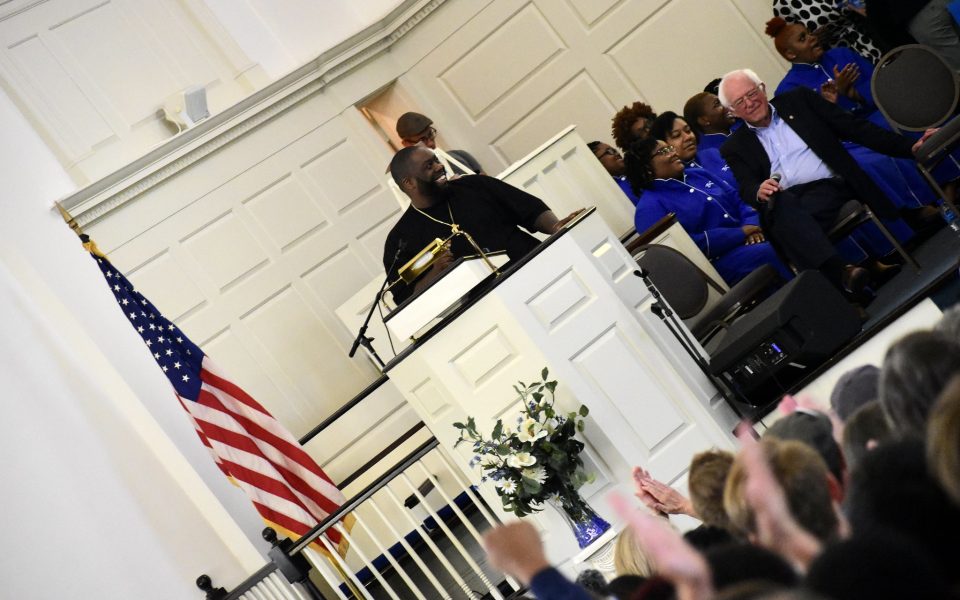It would be hard to imagine a more
conducive setting for Bernie Sanders to make his pitch to black voters in
Greensboro than Prestige Barber College on Phillips Avenue, or a more effective
ambassador than Killer Mike, who himself owns a string of barbershops in Atlanta.
While Joe Biden is the overwhelming favorite among older African-American voters, Sanders holds the edge with black millennials, according to a recent poll by Morning Consult. And he found a receptive audience at Prestige Barber College before moving on to a town-hall at Bennett College on Sept. 20.
“He established a lot of credibility
with me,” CJ Brinson, a youth minister at Genesis Baptist Church, reflected
after Sanders’ visit.
Brinson told me that he typically
supports black candidates because he believes he’s in a better position to hold
them accountable. But he’s making an exception in the case of Sanders, whose
campaign is platforming not only Killer Mike, but also Cornel West, an
outspoken antiracist, Adolph Reed, an early critic of black neoliberalism, and
Nina Turner, who is a national co-chair of the campaign.
“When you have Bernie surrounded by
black leftists who have been branded radicals, that gives me a feeling we have
leverage,” Brinson said. And while other presidential candidates stand beside
civil rights icons, Brinson said black millennials respect the fact that
Sanders’ “ass was drug in the streets.” The evidence was on the T-shirt for
sale in the vendor zone outside Bennett College, showing a 21-year-old Sanders
lurching forward while two police officers grabbed his arms during a 1963
protest against school segregation in Chicago.
Killer Mike, aka Mike Render, who is
also a popular rapper and artist, talked about Sanders’ support for marijuana
decriminalization, and how that could prevent his 17-year-old son from
potentially losing a college scholarship if he were to be arrested for a frivolous
drug charge. He talked about the difference Medicare-for-all would make to his
barbershop clients who tell him they’re not getting their blood pressure or
prostates checked because they’re uninsured.
“There’s two ways that he directly
in a positive way affects us,” Mike said. “I think that deserves, if nothing
else, the support of the guys in the barbershop.”
Mike closed his remarks by imploring
his audience of grassroots black influencers: “I want to encourage the
barbershop because nothing happens without the barbershop. You don’t know which
Nikes are cool. You don’t know which restaurant to eat at. You don’t know what
to do if you don’t hear from the barbershop. So, I’m encouraging black people
in the barbershop, especially our black barbers, to start to talk to your
customers about how his campaign affects them on a daily basis. We see black
boys catching BS cases on a daily basis. We say we need someone who understands
that. Here we have that.”
Brinson told me Sanders sealed the
deal with him through his answer to a question by Gene Blackmon, the owner of
Prestige Barber College, who asked the candidate if he has “a strategic plan to
funnel money into black businesses in the black community.”
Sanders responded by saying that he
supports a program known as the “10/20/30 Plan” devised by US Rep. Jim Clyburn
(D-SC), which would require that 10 percent of federal program funding be set
aside for census tracts where at least 20 percent of residents are living in
poverty. While Sanders noted that economically distressed communities “are more
often than not African American,” the funding formula would also benefit
predominantly white counties in Kentucky, predominantly Latinx counties in New
Mexico and predominantly Native American counties in South Dakota.
Sanders has previously discussed his
support for the 10/20/30 Plan in the context of reparations for slavery.
Incidentally, Sen. Cory Booker — one of Sanders’ opponents in the Democratic
presidential primary — introduced anti-poverty legislation in April with
Clyburn that incorporates the 10/20/30 plan.
“So, to answer your question, there
will be targeted — we’re talking about tens and tens of billions of dollars
going to African-American communities,” Sanders said in Greensboro.
Blackmon pressed him on the
specifics.
“Okay, would it be allocated or
designated to black men and women only?” he asked. “Or will a ‘minority’ tag
allow white women to come in and get some of that money?”
It was a sticking point that
resonated for many in the room, with people calling out, “Come on,” and “Say
it!” to reinforce Blackmon’s question.
“This is for the African-American
community,” Sanders said quietly.
Byron Gladden, a Guilford County
School Board member sharing the campaign appearance on Facebook Live, expressed
satisfaction.
“Specifically,” he said. “All
right.”
Various descriptions of the 10/20/30
Plan that I found on lawmakers’ websites and news reports don’t mention any
stipulation about the race of the contractors or agencies receiving the funds,
only criteria for the areas where the investment would be made. So, it seems
plausible that a contractor providing infrastructure for internet access in
east Greensboro might well be a white person. The Sanders campaign didn’t
respond to a request for clarification on the point in time for publication,
but maybe the candidate was giving an answer to a question that he wasn’t
asked.
Brinson, for one, was unfazed by the
possibility that Sanders had made a promise he won’t be able to fulfill.
“That’s something we can hold him
accountable to,” he said.
Join the First Amendment Society, a membership that goes directly to funding TCB‘s newsroom.
We believe that reporting can save the world.
The TCB First Amendment Society recognizes the vital role of a free, unfettered press with a bundling of local experiences designed to build community, and unique engagements with our newsroom that will help you understand, and shape, local journalism’s critical role in uplifting the people in our cities.
All revenue goes directly into the newsroom as reporters’ salaries and freelance commissions.


Leave a Reply